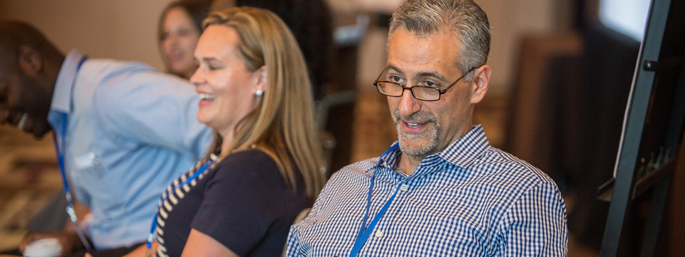Yesterday, we announced that Ariela Rozman and Timothy Daly will transition out of their roles as CEO and President of TNTP by summer 2015. Two senior TNTP executives, Daniel Weisberg and Karolyn Belcher, will lead TNTP going forward. Today, Dan talks about what brought him to work in education, why he’s excited for the next few years, and TNTP’s secret sauce (spoiler alert: it’s the people).
In a past life, you were a lawyer. What led you to work in public education?
I did practice law in the private sector for about 15 years, but I've always been very passionate about public schools. I am a product of the New York City public schools. I was lucky enough to attend Stuyvesant High School, a selective public high school, and though I was a bit of an angry teenager, I had great teachers like Mr. Irgang and Mr. McCourt (now justly famous), who inspired a lifelong love of reading and history. Today, I have two children who attend New York City public schools, including the elementary school my dad, four siblings and I all attended. So the issue of giving every kid a chance to get a great public education is personal for me, as it is for so many other Americans.
As for how I came to actually work in public education, I was just lucky enough to be able to marry my passion with my occupation. Even during my days as a lawyer, I founded an organization in Los Angeles matching volunteers from different professions with middle and high school kids, and spent lots of time mentoring public school students. Then, in the early 2000s, I had an opportunity to meet Joel Klein, who at the time had just become chancellor of New York City’s schools. He ended up recruiting me to be his chief labor strategist, and I worked in that role for six years.
What brought you to TNTP?
My first experiences with TNTP were as a client, which is a great way to get to know an organization. While I was at the NYC Department of Education, TNTP was working on a report that would become Mutual Benefits, and I worked with them to make sure they had all the data they needed and were representing it accurately. All the reports TNTP had published so far were, I thought, outstanding. On top of that, everybody I met from TNTP was passionate, hardworking, really bright, funny, and nice.
So in 2009, when TNTP recruited me for a position heading up its policy work, I jumped at the opportunity. It was a natural transition point in my work for the NYC DOE, since we’d accomplished all the big initiatives Chancellor Klein had brought me in to work on. I was just very fortunate that an opportunity opened up for me at such a great organization that was fighting for all the issues I really wanted to keep fighting for.
What’s kept you here for six years and counting?
Well, being a hard, cynical New Yorker, I assumed that all the amazing people I met from TNTP when I was at the DOE were just the front for all the jerks they were hiding back in the office. But what I found when I came to TNTP was a collection of smart, passionate, hardworking, nice people. Everyone was just a pleasure to work with.
That’s still true today. It’s a testament to the strong culture that’s existed at TNTP from its days as a startup, which makes it a place where you really look forward to work every day. We work on very difficult problems here. But what I think keeps us all coming back is the tremendously positive, supportive culture filled with great people who come from very diverse professional, political and personal circumstances. I'm proud every day I get a chance to work with these folks.
Plus, Ari [Rozman, TNTP’s CEO] does a great job feeding us. Whenever she’s in the office, we tend to have good food. And I like to eat.
What’s one thing you took away from your time working for New York City public schools that shapes your work at TNTP?
A big thing I learned is that in New York—and I’ve found this to be true in almost every school district I’ve ever worked with—you had a lot of talented and dedicated people working within an institution that doesn’t set them up to make the most of those talents. And one thing Chancellor Klein did in New York that was critically important, beyond any specific policies, was that he expanded the sense of possibility for everyone involved, gave us confidence we could do better by kids than we had been able to before.
If you're working in an institution that has struggled for a long time, you have to inspire the people in the organization, nearly all of whom believe in the mission, by simply saying, “I believe.” I believe we can take schools that are educating kids who face all sorts of challenges—who come from poor families, or face disabilities or are just learning English, or who are lagging far behind academically for whatever reason—I believe these schools can become places where the majority of these students succeed. It’s just really important to get people to think differently about the impact they can have.
Looking ahead to the next couple of years at TNTP, what are you excited most about?
I think we have the opportunity in the next couple of years to become the go‑to partner for school districts, state departments of education and charter school networks to help them accomplish their goals for student success. We now have the wherewithal in size and expertise to help our partners to overcome whatever obstacles they’re facing in helping their students succeed.
I truly believe that everything we’ve done over the last 15 years has led us to a point where we can make an impact on more students than ever before. And we’re going to hold ourselves accountable for doing that.
What’s something you’ve learned from Ari Rozman and Tim Daly [TNTP’s current CEO and president] that you want to carry with you as you take over as CEO?
I have been extremely fortunate to get to work with and for both Ari and Tim. They really are among the most talented leaders I have ever seen.
Probably the most valuable thing I’ve learned from Ari is not only how to prioritize results, but prioritize people and the culture of the organization just as much. She has done a masterful job of balancing those priorities, and I want to make sure we continue to maintain that balance.
I’ve learned so much from Tim, too. The thing he does better than anybody in the field is talk about the need for change in a compelling way. We are in a field where, in spite of the tremendous talent and desire, we are still not succeeding with most of our kids. Tim is able to talk about that in a way that appeals to policy insiders as well as people who are just casual observers, and in a way that everyone finds to be reasonable and practical. That is such an important talent. If we can’t persuade people of the urgency for change, change isn’t going to happen and schools are going to keep failing too many kids.
You mentioned that you have two kids in public schools. Is it true that you also coach your kids in what seems like almost every junior sports league in Brooklyn, in addition to doing everything you do at TNTP? What’s your secret?
Well, I dump a lot of work onto my team. I don't actually work that much.
Okay, there’s truth in jest, but seriously, everybody in this organization and in public education in general works really, really hard. Teachers and principals routinely work 12-hour days, six or seven days a week. That can’t help but inspire you to work even harder yourself.
But you have to make sure you spend time doing things that recharge your batteries. For me, that means spending time with my wife and kids when I can really focus on them, whether at dinner or coaching them in basketball. I might need to answer some emails at night after I’m done coaching a game or get up a little early to take a phone call. But it’s well worth it because without that daily connection with my family, life would become pretty hollow.







